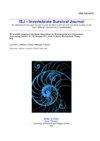The potential immune alterations in insect pests and pollinators after insecticide exposure in agroecosystem
IF 1.2
4区 农林科学
Q4 IMMUNOLOGY
引用次数: 4
Abstract
Agroecosystems are the habitat of pests and beneficial insects from different orders, which are exposed to agro-practices, especially treatments with chemicals. Insecticides are a wide group of chemicals used in agroecosystems that affect insect ecology and physiology in different ways. Among physiological components affected by insecticides, the immune system (IS) is an important one, enabling insects to resist against invading microorganisms and parasitoids thanks to the action of hemocytes and humoral components. So the determination of any immune alterations should be considered as a critical issue in insecticide application within agroecosystems. Insecticides of synthetic or natural origin, e.g. insect growth regulators (IGRs) and botanicals, are frequently cytotoxic and alter hemocyte morphology and number, impairing cellular-based immune responses in addition to humeral responses. Exposure of pollinators to neurotoxin insecticides like neonicotinoids may inhibit the immune-related transcription factor, NF-B, with a negative impact on the expression of antimicrobial peptides, melanization and clotting. In contrast, some IGRs may have enhancing effects on hemocyte spreading mainly plasmatocytes and cellular-based immune responses. Chemical insecticides have several impacts on the physiology of insects in which immune modulation is one of the most important cases because any alteration may alter their ability to respond toward invading pathogens and directly their survival. This is more severe once pollinators are in contact with chemicals because of the presence of several pathogenic agents that directly influence their performance.农药暴露对农业生态系统中害虫和传粉昆虫免疫系统的潜在影响
农业生态系统是不同目害虫和益虫的栖息地,它们受到农业实践,特别是化学品处理的影响。杀虫剂是在农业生态系统中广泛使用的一组化学品,以不同的方式影响昆虫的生态和生理。在受杀虫剂影响的生理成分中,免疫系统(IS)是一个重要的生理成分,它通过血细胞和体液成分的作用,使昆虫抵抗入侵的微生物和拟寄生虫。因此,确定任何免疫改变应被视为在农业生态系统中施用杀虫剂的关键问题。合成或天然来源的杀虫剂,例如昆虫生长调节剂(IGRs)和植物药,通常具有细胞毒性,并改变血细胞形态和数量,损害细胞免疫反应和肱骨反应。传粉媒介暴露于新烟碱类等神经毒素杀虫剂可能抑制免疫相关转录因子NF-B,对抗菌肽的表达、黑色素化和凝血产生负面影响。相反,一些igr可能对血细胞扩散(主要是浆细胞)和细胞免疫反应有增强作用。化学杀虫剂对昆虫的生理有几种影响,其中免疫调节是最重要的情况之一,因为任何改变都可能改变它们对入侵病原体的反应能力并直接改变它们的生存。一旦传粉媒介接触到化学品,这种情况就会更加严重,因为存在几种直接影响传粉媒介表现的致病菌。
本文章由计算机程序翻译,如有差异,请以英文原文为准。
求助全文
约1分钟内获得全文
求助全文
来源期刊

ISJ-Invertebrate Survival Journal
IMMUNOLOGY-ZOOLOGY
CiteScore
2.10
自引率
0.00%
发文量
0
审稿时长
>12 weeks
期刊介绍:
Invertebrate Survival Journal (ISJ) is an international and open access journal devoted to prompt and innovative studies on the basic defense mechanisms in invertebrates, in particular with a view to identifying biotechnologies able to act against derived diseases and related economic damage.
Contributions will be mainly in the form of Letters to the Editor, Visions and Perspectives, Short Communications, Technical Reports, Research Reports, Review, Minireview and Reports of Meetings. Letters to the Editor can be commentaries or perspectives on invertebrate defence mechanisms or replies to the data published in ISJ.
 求助内容:
求助内容: 应助结果提醒方式:
应助结果提醒方式:


